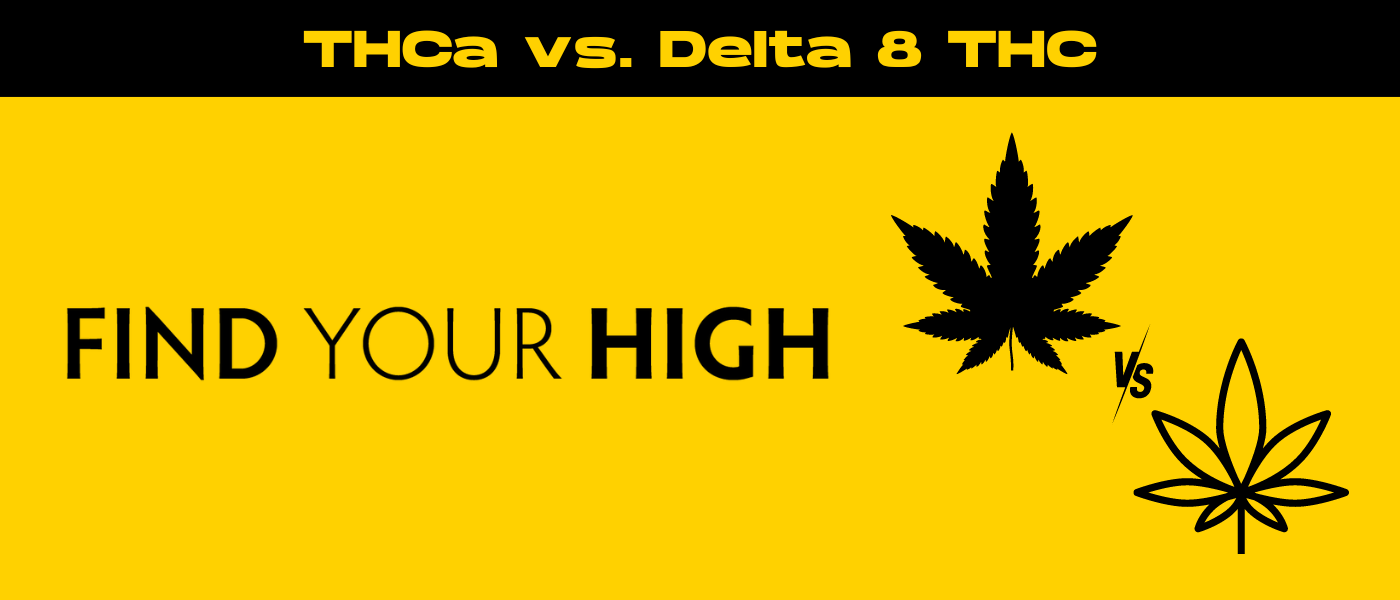Curious about the hype around THCa vs Delta 8? You’ve come to the right place! These cannabinoids are gaining attention in the cannabis community, but what sets them apart?
Understanding the differences between THCa and Delta 8 is crucial for anyone looking to maximize their benefits and make informed decisions. In this blog, we’ll break down what THCa and Delta 8 THC are, explore their unique properties, benefits, and potential side effects. Plus, we’ll touch on their legal status and how to choose the right product for you.
So, let’s dive in and get a clearer picture of these two fascinating compounds.
What is THCa?
THCa, or tetrahydrocannabinolic acid, is a non-psychoactive cannabinoid found in raw and live cannabis plants. Chemically, it is the precursor to THC, the well-known compound responsible for the “high” associated with cannabis.
THCa is produced in the cannabis plant through biosynthesis, where it initially forms from cannabigerolic acid (CBGA) before converting into THCa through enzymatic reactions.
Typically, THCa is abundant in fresh cannabis leaves and hemp flowers before they are dried and cured. Once exposed to heat through a process called decarboxylation, THCa transforms into THC, unlocking its psychoactive properties. This makes raw hemp flower a common source of THCa, especially in products like freshly harvested flower and cold-pressed extracts.

How Does THCa Work?
THCa works its magic by interacting with the endocannabinoid system (ECS), a complex network of receptors in the body that plays a key role in maintaining homeostasis.
However, unlike its psychoactive cousin THC, THCa doesn’t bind directly to CB1 receptors in the brain, which is why it doesn’t produce a “high.” Instead, THCa influences other receptors and enzymes such as TRPA1 and MMP9, contributing to its anti-inflammatory and neuroprotective effects.
This non-psychoactive nature of THCa makes it appealing for those looking to reap the health benefits of cannabis without any mind-altering impacts.
Benefits of THCa
Medical benefits
THCa offers a range of medical benefits that have caught the attention of researchers and users alike. It’s considered to have promising medicinal applications, despite not being psychoactive.
Anti-inflammatory properties
One of the standout benefits of THCa is its powerful anti-inflammatory properties. It can help reduce inflammation, making it useful for conditions like arthritis and inflammatory bowel diseases.
Neuroprotective effects
THCa has been shown to possess neuroprotective properties, meaning it may help protect the brain from damage and degeneration. This could be beneficial for individuals with neurodegenerative disorders such as Alzheimer’s and Parkinson’s disease.
Potential therapeutic uses
The wide range of potential therapeutic uses for THCa includes easing symptoms of nausea, appetite loss, and pain. Its non-psychoactive nature makes it an attractive option for those who need regular relief without the intoxicating effects of THC.
Consumption Methods for THCa
When it comes to enjoying the benefits of THCa, there are a few versatile methods available.
One popular option is consuming raw cannabis, which includes using fresh leaves and flowers in your daily routine. You can add these to salads or simply chew on the leaves.
Another tasty way to intake THCa is through juices and smoothies. Blending fresh cannabis leaves with fruits and veggies makes for a nutritious and refreshing drink. If you prefer a more concentrated approach, tinctures and topicals are excellent choices.
THCa tinctures can be taken sublingually, allowing for quick absorption, while topicals can be applied directly to the skin to target specific areas of discomfort without any psychoactive effects.
What is Delta 8?
Delta 8 THC, or Delta-8-tetrahydrocannabinol, is another cannabinoid found in the cannabis plant.
Chemically similar to Delta-9-THC, which is known for its strong psychoactive effects, Delta 8 offers a milder psychoactive effects. This cannabinoid is present in much smaller concentrations in cannabis compared to its Delta-9 counterpart.
The chemical structure of Delta 8 differs only slightly, with a double bond located at the eighth carbon chain, whereas Delta-9 has it at the ninth. This minor distinction results in differences in their effects on the body and mind.
Delta 8 is produced naturally through the aging process of cannabis. Over time, and in the presence of oxidation, Delta-9-THC converts to Delta 8, albeit in minimal amounts.
Due to its scarcity, Delta 8 THC is often synthesized using hemp-derived CBD through a process called isomerization, which rearranges the molecular structure. This allows for greater quantities of Delta 8 to be made available for commercial use.
Common sources of Delta 8 include vape cartridges, edibles, and tinctures, making it accessible for a variety of consumption methods.
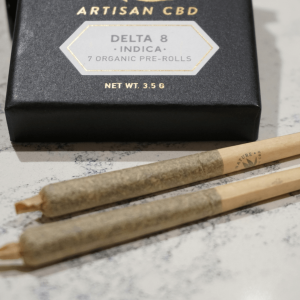
How Does Delta 8 Work?
Delta 8 interacts with the endocannabinoid system (ECS), just like other cannabinoids. The ECS consists of receptors such as CB1 and CB2 dispersed throughout the body, playing a crucial role in regulating mood, pain, appetite, and other physiological processes.
Delta 8 binds mainly to CB1 receptors, which are predominantly found in the brain and central nervous system. This interaction is responsible for its psychoactive effects, although they are generally reported to be milder and more clear-headed than those of Delta-9-THC.
The psychoactive properties of Delta 8 are one of its key distinctions. Users often describe the high from Delta 8 as being more subdued, providing relaxation and a sense of well-being without the intensity or possible anxiety that can accompany Delta-9-THC. These properties make Delta 8 appealing to individuals seeking the benefits of THC without being overwhelmed by its psychoactive strength.
Whether managing stress or looking for a lighter recreational experience, Delta 8 offers an alternative that combines efficacy with a gentle touch.
Benefits of Delta 8
Medical benefits
Delta 8 offers various medical benefits, including aiding in the treatment of nausea and vomiting, which can be particularly helpful for chemotherapy patients. However, do not take this as professional medical advice; always consult with a healthcare professional when using hemp-derived products for medicinal purposes.
Pain relief
This cannabinoid is known for its analgesic properties, providing relief from chronic pain and inflammation without the intense high of Delta-9-THC.
Anxiety reduction
Delta 8 may help reduce anxiety and stress, offering a more relaxed and clear-headed effect, making it a great option for those who want to calm their mind without feeling too sedated.
Potential therapeutic uses
The potential therapeutic uses for Delta 8 extend to enhancing appetite, reducing nausea, and possibly offering neuroprotective benefits. These attributes make it a versatile option for addressing a range of health issues.
Consumption Methods for Delta 8
- Vaping: Vaping is a popular and convenient method for consuming Delta 8. It allows for quick absorption into the bloodstream, providing almost immediate effects. Users can choose from a variety of vape cartridges and pens that are specifically designed for Delta 8.
- Edibles: Edibles offer a tasty and discreet way to enjoy the benefits of Delta 8. These can range from gummies and chocolates to baked goods, providing a longer-lasting effect compared to other methods due to the way the cannabinoid is metabolized by the body.
- Tinctures and oils: Tinctures and oils are versatile consumption methods that can be taken sublingually for fast absorption, or added to foods and beverages for a more gradual onset of effects. These options allow for precise dosing, enabling users to tailor their Delta 8 THC intake to their specific needs.
Legal Status of THCa
Federal Laws
The legal status of THCa (Tetrahydrocannabinolic Acid) in the United States is somewhat complex. Federally, cannabis and its derivatives, including THCa, are classified under Schedule I of the Controlled Substances Act. This classification implies that they are considered to have a high potential for abuse with no accepted medical use.
However, THCa itself is not psychoactive until it is decarboxylated (heated), which converts it to THC. As a result, its legal standing can vary depending on interpretation and specific circumstances.
State-By-State Regulations
State laws regarding THCa products can differ significantly. In states where cannabis is legal for either medical or recreational use, products containing THCa are generally permitted. For example, in states like California and Colorado, consumers can legally purchase and use cannabis products that contain THCa.
However, in states with stricter cannabis laws, the possession and use of THCa can still be considered illegal. It is essential for consumers to check local regulations to understand the legality of THCa in their specific state.
Legal Status of Delta 8
Federal Laws
The legal status of Delta 8 is quite murky at the federal level. While the 2018 Farm Bill legalized hemp and its derivatives, including cannabinoids like CBD, Delta 8 falls into a gray area. This federally legal status applies as long as the Delta 8 THC is derived from hemp and the final product contains less than 0.3% Delta-9 THC.
However, the Drug Enforcement Administration (DEA) has issued statements suggesting that synthetically derived Delta 8 may be considered illegal, which introduces further ambiguity.
State-By-State Regulations
State regulations on Delta 8 vary widely and are rapidly evolving. Some states have explicitly banned Delta 8, including states like Alaska, Colorado, and New York, citing concerns over its psychoactive properties and lack of regulation.
Conversely, other states permit the sale and use of Delta 8 THC as long as it complies with the federal stipulations set by the Farm Bill. As regulations are continually changing, consumers should stay informed about their state’s current laws regarding Delta 8 to ensure compliance.
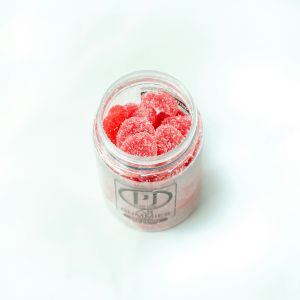
Safety and Side Effects of THCa
Common Side Effects
Although THCa is non-psychoactive and generally well-tolerated, some users may still experience side effects. These can include mild gastrointestinal discomfort, such as nausea or upset stomach, particularly when consumed in higher doses.
Additionally, some individuals might experience dizziness, dry mouth, or fatigue. It’s important to start with a low dose, especially if you’re new to THCa, to gauge how your body reacts.
Long-Term Safety Concerns
The long-term safety profile of THCa is still under research, but current findings suggest it does not carry the same risks as its psychoactive counterpart, THC. As with any cannabinoid, prolonged and high-dose use could potentially lead to desensitization of cannabinoid receptors, which might reduce its efficacy over time.
More studies are necessary to fully understand the long-term implications of regular THCa consumption, particularly regarding its impact on liver function and overall metabolic health.
Safe Dosage Guidelines
Setting a standard safe dosage for THCa is challenging due to the variability in individual tolerance and the specific product’s potency. As a general guideline, starting with a small dose, such as 5-10 milligrams, and gradually increasing it while monitoring for any adverse reactions is advisable.
Consulting with a healthcare professional experienced in cannabinoid therapy can also provide personalized dosage recommendations based on individual health needs.
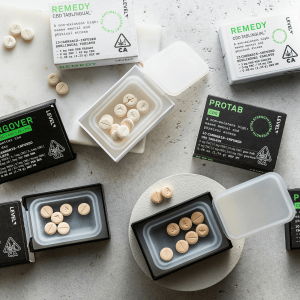
Safety and Side Effects of Delta 8
Common Side Effects
While Delta 8 is known for its milder effects compared to Delta-9-THC, it still can cause some side effects. Commonly reported issues include dry mouth, red eyes, dizziness, and mild paranoia, especially at higher doses.
Some users have also mentioned feeling drowsy or experiencing changes in appetite. As with any cannabinoid, starting with a low dose can help mitigate these side effects.
Long-Term Safety Concerns
The long-term use of Delta 8 THC is not well-documented, as research is still in its early stages. Potential concerns revolve around the regular inhalation of vaporized products and their impact on lung health.
Another consideration is the lack of regulatory oversight on Delta 8 THC products, raising questions about purity and the presence of contaminants. Continuous, high-dose use might also desensitize cannabinoid receptors, reducing the effectiveness over time.
Safe Dosage Guidelines
Determining a safe dosage for Delta 8 THC involves considering factors such as individual tolerance, method of consumption, and desired effects. For beginners, a starting dose of around 10-20 milligrams is recommended, with adjustments made based on personal response and tolerance levels.
Edibles can produce a stronger and longer-lasting effect, so beginning with a smaller dose in these forms is advisable. Always consult with a healthcare provider for tailored advice, especially if you have underlying health conditions or are taking other medications.
THCa vs Delta 8: Comparison of Potency
When it comes to the potency of THCa versus Delta 8, there are distinct differences that users should be aware of.
But first thing first: Potency often refers to the strength of the effects produced by these cannabinoids and can greatly influence user preference and therapeutic outcomes.
Understanding the relative potency of THCa and Delta 8 can help consumers make informed decisions based on their individual needs and tolerance levels.
Potency of THCa
When it comes to THCa, potency is a bit of a nuanced topic. THCa itself is non-psychoactive, meaning it doesn’t produce that “high” feeling commonly associated with THC. Instead, THCa is often prized for its potential therapeutic benefits.
However, once THCa is exposed to heat through a process like smoking or vaping, it converts to THC, which is psychoactive and much more potent in terms of its mind-altering effects.
Potency of Delta 8
Delta 8 THC, on the other hand, is naturally psychoactive, but it’s known to be milder compared to Delta-9 THC.
Users often describe the effects of Delta 8 THC as less intense, providing a smoother, more relaxed experience without the anxiety or paranoia sometimes associated with Delta-9. This makes Delta 8 a popular choice for those looking for a lighter, more manageable high.
Factors Affecting Potency
Several factors can influence the potency of THCa vs Delta 8 THC:
- Method of Consumption: Smoking, vaping, or edibles all have different onset times and duration of effects, which can impact how potent the substance feels.
- Individual Tolerance: Each person’s endocannabinoid system is different, so what feels potent to one person might be mild for another.
- Product Quality: The concentration of THCa or Delta 8 in products can vary, impacting overall potency. High-quality, lab-tested products tend to be more consistent in their effects.
- Decarboxylation: For THCa, this process converts it into THC, significantly increasing its potency and psychoactive effects.
- Presence of Other Cannabinoids: The entourage effect, where other cannabinoids enhance or modulate the effects of THCa or Delta 8, can also play a role in the overall potency experienced by the user.
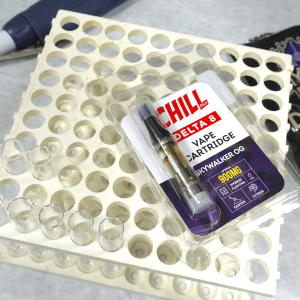
Conclusion
In summary, in the battle between THCa vs Delta 8, both present unique benefits and considerations. THCa is non-psychoactive and valued for its potential therapeutic properties, while Delta 8 THC offers a milder, more manageable high compared to its counterpart, Delta-9-THC. It’s essential to start with low doses of either cannabinoid to gauge your body’s response and consult with healthcare professionals for personalized advice.
As research continues, users can look forward to a deeper understanding of these cannabinoids’ long-term safety and efficacy. Whether you’re seeking relief without a high or a gentler psychoactive experience, understanding these key differences can help you make informed decisions.
THCa vs Delta 8 THC: Frequently Asked Questions
1. Is THCa better than Delta 8?
The answer depends on what you’re looking for. THCa is non-psychoactive and often sought after for its potential health benefits without the “high.” It’s a great option for those who want the therapeutic perks without altering their state of mind.
On the other hand, Delta 8 THC is mildly psychoactive and can provide a relaxed, calmer high without the intensity of Delta 9. So, “better” is subjective and really comes down to your personal preferences and needs.
2. Can THCa cause a high?
THCa itself won’t get you high. It’s the raw, acidic form of THC and doesn’t interact with the brain’s cannabinoid receptors in the same way.
However, when THCa is exposed to heat through processes like smoking or vaping, it converts to THC, which is psychoactive. So, if you’re consuming it in a way that decarboxylates the THCa, then yes, it can cause a high.
3. How powerful is THCa?
In its raw form, THCa is not considered powerful in terms of psychoactive effects because it doesn’t cause a high. However, it’s potent in other ways, particularly its potential therapeutic benefits.
It’s known for its anti-inflammatory, neuroprotective, and anti-emetic properties, among others. Once converted to THC, its potency increases significantly in terms of psychoactive effects.
4. Does THCa get you as high as Delta 9?
THCa itself does not get you high at all. But when it’s decarboxylated and converted into THC, the resulting high can be as potent as Delta 9 THC. In fact, after decarboxylation, the THC is virtually identical to Delta 9 in its psychoactive effects.
So if you’re seeking an experience similar to Delta 9, consuming THCa in a way that involves decarboxylation will get you there.

 Rewards
Rewards



